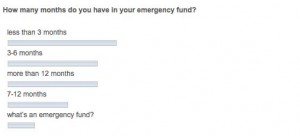 If you own a boat that’s large, expensive, and is likely to take on water from time to time, you plan well ahead and put in a bilge pump.
If you own a boat that’s large, expensive, and is likely to take on water from time to time, you plan well ahead and put in a bilge pump.
But, if you have a dinghy and you’re paddling out on Lake Michigan, far away enough from shore to make swimming a poor second choice, then you carry a bucket … and, if the boat springs a leak (highly unlikely … it’s not a bad dinghy) or, water happens to come over the side from time to time …
… well, you start bailing water!
An Emergency Fund’s a little like that:
What you do depends on whether you expect the emergency [AJC: I know, it’s an oxymoron] or not. Of course, if you expect it – or, can reasonably foresee it (like problems with a beaten up old car), then it’s not an emergency at all … just something that you can’t budget an exact amount for.
But, you can provision for it; at least, as best you can.
But, true emergencies do arise – or, semi-expected events blow up bigger and/or sooner than you ‘expected’ – so what do you do?
Try and build up and emergency fund but not spend it even if a really great investing opportunity comes up [AJC: what’s the opportunity/cost of that?!]?
 Or, why don’t you simply find a bucket of money that you can tap into IF an emergency arises … but, one that costs you zip (or, even makes you money) in the LIKELY event that an emergency does NOT arise.
Or, why don’t you simply find a bucket of money that you can tap into IF an emergency arises … but, one that costs you zip (or, even makes you money) in the LIKELY event that an emergency does NOT arise.
Here are some examples of In-Case-Of-An-Emergency-Please-Break-The-Glass Funds:
1. A HELOC (home equity Line of Credit) that you put in place on your home ‘just in case’
Use an online mortgage calculator to make sure that you can borrow enough to cover your likely living costs + the repayments for as long as you think it will take you to get back on your feet and repay the loan. This is a pretty good, flexible option that only costs what you use.
The other advantage is that you should be able to raise a LOT more than you can save … and, it will be available as soon as you put the paperwork in place (a true emergency fund could take YEARS to save).
On the other hand – say, if you lose your job and the bank finds out – the HELOC may be revoked just when you need it the most … of course, if you’ve already drawn down the funds before the ‘pink slip’ is in your hands …. 😉
2. Your 401k
There are usually provisions that allow you to borrow or withdraw funds against your Retirement Account; again, this may allow for ‘protection’ against fairly large emergencies (say, a few months off work), but it may come at a hefty opportunity cost … particularly, if the fund rules don’t allow for the funds to go back in on a tax-preferred basis, if you’ve managed to recover quickly enough.
Also, the tax and/or penalty interest costs may be quite high.
3. Your Car
Maybe you can do a sale and lease-back on your car .. or, maybe you can sell your car for cash and either use some of the proceeds to ‘trade down’ (therefore, freeing up some cash) or even make an exception to the “don’t finance a depreciating asset rule” by financing a (cheaper) one, instead (thereby, freeing up a lot more cash).
Remember, you’re really borrowing some money to tide you over in an emergency … you don’t expect to get out of it squeaky clean.
4. Credit Cards
Yep … this is the time that a bunch of credit cards sitting in a drawer can be really useful … but, it’s very expensive (19%+ p.a.) so make sure you only take this route for really short-term emergencies that you KNOW you can trade your way out of really quickly (i.e. less than a year).
5. The Three F’s
And … don’t forget that getting on your hands and knees and grovelling to your Friends, Family, or other associated Fools is also an option!
Anybody have any other true ‘Emergency Fund’ source ideas?
 A couple of weeks ago, I shared my thoughts on how – and why – to set up an emergency fund with just $0. For a start, it doesn’t take much cash 😉
A couple of weeks ago, I shared my thoughts on how – and why – to set up an emergency fund with just $0. For a start, it doesn’t take much cash 😉





